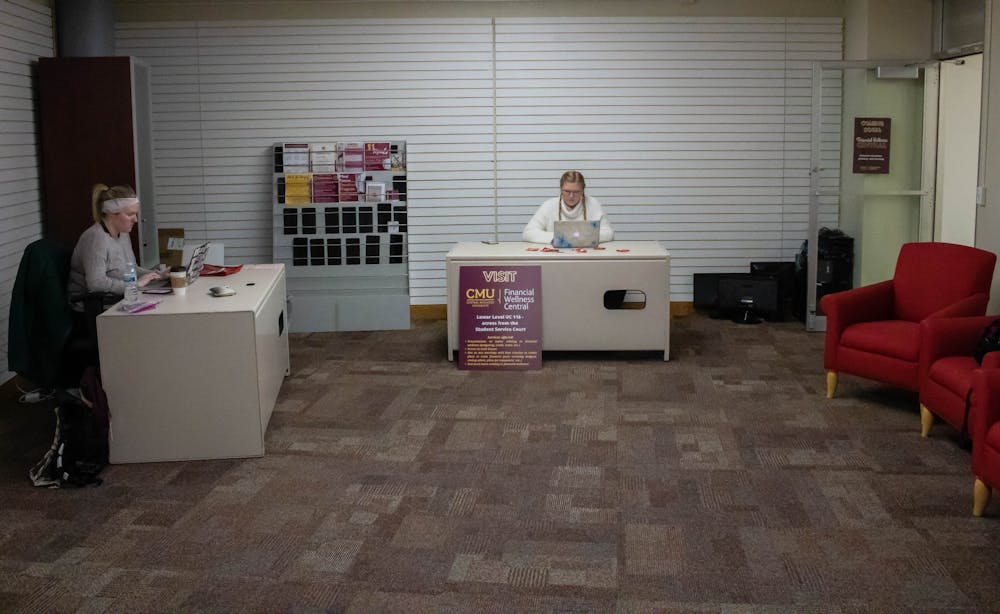Financial Wellness Center aims to guide students through college finances

Financial Wellness Collaborative, a program that aims to help educate Central Michigan University students on finances, opened the doors of its new location Feb. 10 in the University Center.
The new Financial Wellness Central, located in the Bovee University Center, Room 116, is currently open from 8 a.m. to 5 p.m. The official grand opening will occur March 19.
Prior to its new location, the program was operating out of a cubicle in Warriner Hall. Since the move, Financial Wellness Collaborative is “front and center to build awareness for prospective, current students and alumni,” Financial Wellness Collaborative co-director Alex Kappus said.
“The purpose of the space is to make these educational programs and services visible to students in a high traffic area of campus,” Kappus said. “The proximity to the Student Service Court is ideal, as we have strong partnerships with the staff in Billing and Financial Aid. They will refer students to us for money-related topics beyond that of billing and financial aid.”
The Financial Wellness Collaborative started in 2017 when co-director Kimberly Wagester worked as interim director of Student Account Services. She worked closely with Kappus, who was then a student service adviser.
“The primary goal (of the Financial Wellness Collaborative) is ... to educate students on personal financial matters whether it’s credit, budgeting, or loan repayment, or various topics like that," Wagester said. "Our goal is to inspire confidence in students in their financial matters."
Wagester noticed some students were unaware of certain financial points when speaking to student service advisers. While she watched advisers work with students, she noticed a common theme.
"They didn’t know what their bill was going to be, they didn’t know how much their tuition was, how much their financial aid was," she said. "A lot of the very important pieces of information--they didn’t know what they were, or they didn’t know where to find them.”
One project that evolved to tackle these issues was the pre-billing estimate available for students to view their expenses. Wagester and Kappus also began to give presentations to directly teach students about finances.
“Once we started (giving presentations), the volume and the requests just blew up, and we couldn’t handle what was being requested of us,” Wagester said.
Eventually the two took different jobs at CMU, but the shift in their roles did not change their involvement in Financial Wellness Collaborative.
“I actually came back to (my current) job, and Alex took a different job in student services,” Wagester said. “Both of our supervisors saw the value in what we were trying to do, asked us to continue doing it and to put a work group together to make a recommendation on how we could make this go forward.”
Questions asked at the program often involve loan repayments, budgeting and challenges with life after college. What is discussed is often dependent on the age of the person seeking financial guidance.
To offer guidance, Financial Wellness Center uses Money Mentors, who are CMU undergraduate students. Money Mentors are split into three categories: office assistants, peer educators and peer coaches.
Office assistants are responsible for assisting with questions in Financial Wellness Center, while peer educators are students who table or give presentations around campus.
As for peer coaches, these are the individuals who work directly with students to help with budgeting or any other financial subject.
This group of students receives “extensive” training on financial aid and student account services, Wagester said. These coaches also work with a local personal financial planner who helps them complete some of their coaching.
The program also hosts two graduate assistants that help its operation.
One of the graduate assistants, Sarah Fischer, from Birmingham, knew little about finances when she joined the Financial Wellness Collaborative. However, after seeing how “passionate” the individuals interviewing her were, she knew she was interested in being a part of the program.
“They were very focused on social justice issues and making sure students feel supported and confident,” Fischer said. "I learned the finance piece, which is huge, but really the biggest appeal to me was that we were going to be creating something that was going to be helping students.”
By learning more about finances from the Financial Wellness Collaborative, Fischer has been able to create an impact beyond the presentations she has given.
“We were presenting at IMPACT and a student stayed after," Fischer said. "It turned out she was a first-generation student. She was really freaking out about her classes and her loans. I stayed with her for 40 minutes after our presentation ended... I got her into the Student Service Court and they got her all taken care of on payment plans. She still sends me a text every now and then just to keep me updated.”
Financial Wellness Collaborative seeks to not only help students now, but also to equip students with resources that can help beyond their time at CMU.
“At the end of the day, we need to consider what kind of skills CMU students should (know) when they move across the stage at graduation,” Kappus said. “We know finances can be scary or intimidating, but by speaking with peers about these topics, we have lowered the barrier to access this important education that will have an impact on students’ lives today and for many years to come."







